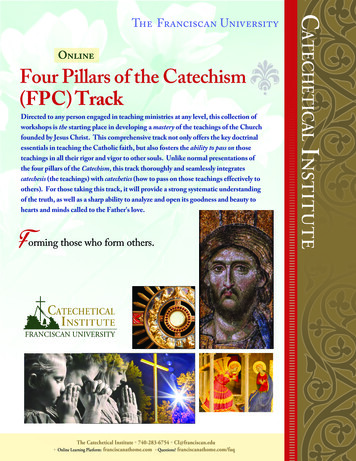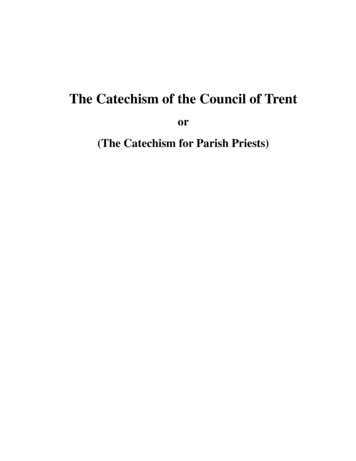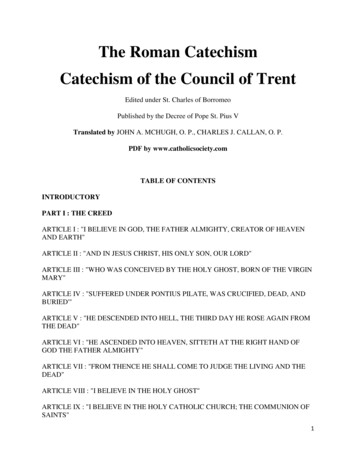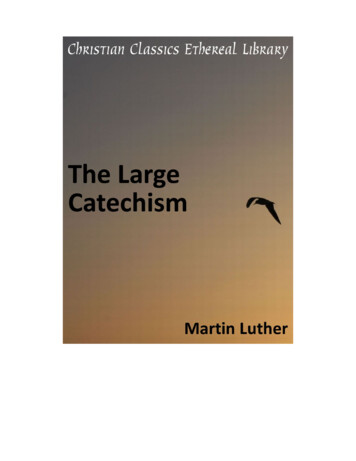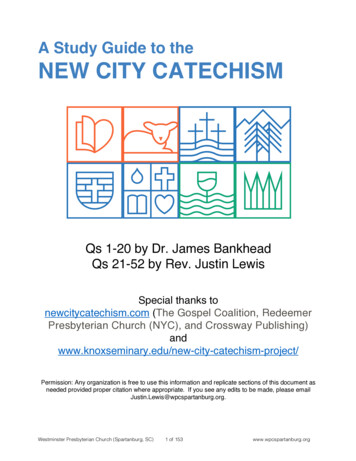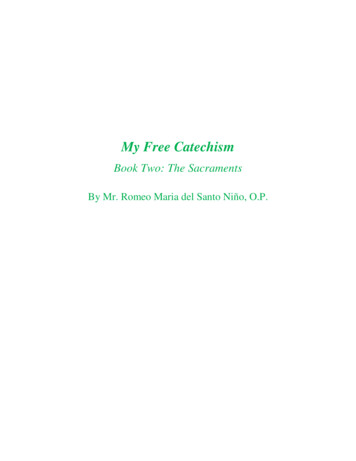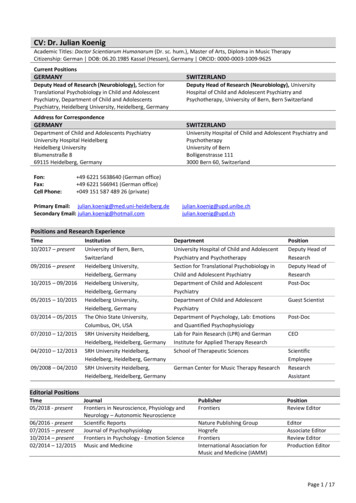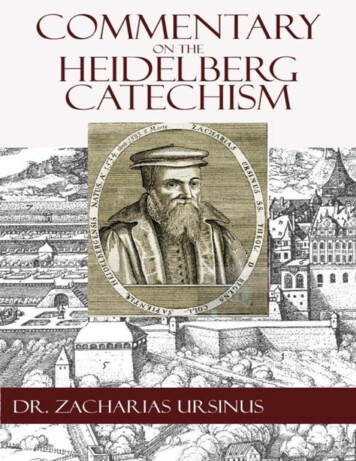
Transcription
THE COMMENTARY OF DR.ZACHARIAS URSINUSON THE HEIDELBERG CATECHISMTRANSLATED FROM THE ORIGINALLATIN,BY THE REV. G. W. WILLIARD, D. D.FOURTH AMERICAN EDITIONPRINTING COMPANY, 1888.CINCINNATI:ELMSTREETTABLE OF CONTENTSTHE TRANSLATOR'S PREFACEINTRODUCTIONGENERAL PROLEGOMENAWhat the doctrine of the church isWhat the parts of this doctrine are, with their differencesIn what the doctrine of the church differs from that of other systems ofreligion, philosophy, &c.By what testimonies the truth of the Christian religion, or the doctrine ofthe church is confirmedHow mani-fold the method of teaching and learning the doctrine of thechurch is
SPECIAL PROLEGOMENAWhat Catechising isOf the origin of CatechisationOf the parts or principal heads of the doctrine of the CatechismOf the necessity of CatechisationWhat the design of Catechism and the doctrine of the church isOF TRUE CHRISTIAN COMFORTWhat Comfort isThe parts of which it consistsWhy this comfort alone is solidWhy it is necessaryHow this comfort may be obtainedOF THE MISERY OF MANWhat it is, and whence it may be knownWhat the law of God requiresOF THE CREATION OF MANThe state in which man was originally createdThe end for which God created manOF THE IMAGE OF GOD IN MANWhat it is, and what the parts thereof
To what extent it is lost, and what remainsHow it may be restored in usOF THE FALL AND FIRST SIN OF MANWhat the sin of our first parents wasWhat the causes of it wereWhat the effects thereofWhy God permitted itOF SIN IN GENERALThe proofs of our sinfulnessWhat sin isOriginal sin, and what it isThe proofs of original sinObjections against original sin refutedActual sinReigning sin and sin not reigningMortal and venial sinSin against the conscience, &c.The sin against the Holy GhostRules to be observed in reference to the sin against the Holy GhostSin per se, and sin by accident
The causes of sinThe effects of sinTHE FREEDOM OF THE WILLThe principal question to be considered in reference to this subjectWhat the freedom of the will isIn what the Liberty which is in God differs from that which is in hiscreatures, angels and menWhether there be any Freedom of the human willWhat Liberty belongs to man according to his four-fold stateThe question, whether God does any injustice to man, by requiring fromhim in his law what he cannot perform, consideredThe punishment of sin:How this comports with the mercy of GodCONCERNING AFFLICTIONSHow many kinds of affliction there areA table of the afflictions of manThe causes of afflictionsComforts under afflictionsTHE DELIVERANCE OF MANIn how many ways satisfaction may be madeWhat the deliverance of man is
Whether such a deliverance be possibleWhether deliverance be necessary and certainWhether perfect deliverance may be expectedHow this deliverance is acomplishedThe question whether we ourselves can make this satisfaction, consideredThe question whether any mere creature can make satisfaction for us,consideredWhat sort of a mediator we must seek forWhy he must be very man and perfectly righteousWhy he must be very GodTHE DOCTRINE OF THE MEDIATORWhat a mediator isWhether we need a mediatorWhat the office of the mediator isWhat kind of a mediator is necessaryWho this mediator isWhether there can be more than one mediatorTHE COVENANT OF GODWhat this covenant isWhether it be one or moreIn what the old and new Covenants agree and differ
OF THE GOSPELWhat the Gospel isThe question, Whether the gospel has always been known, consideredIn what the Gospel differs from the LawWhat the effects of the Gospel areFrom what the truth of the Gospel appearsThe question, Whether all men as they perished in Adam, are saved inChrist, consideredTHE SUBJECT OF FAITHWhat faith isHow many kinds of faith there areIn what faith and hope differWhat the causes of faith areWhat the effects of faithTo whom faith is givenThe assurance of faith, with a refutation of certain objectionsThe objects or contents of faithTHE APOSTLES' CREEDWhy it is called apostolicWhy other creeds were introducedWhy the greatest authority should be attached to the Apostles' Creed
The division of the CreedCONCERNING THE ONE TRUE GODThe evidences of the existence of GodWho, and what God isThe unity of GodWhat the terms Essence, Person, and Trinity signify, and in what theydifferWhether the church should retain these termsThe number of persons in the GodheadHow these persons are distinguishedWhy the church should retain the doctrine of the TrinityObjections against the doctrine of the Trinity refutedOF GOD THE FATHERWhat it is to believe in God the Father Almighty, Maker, &c.OF THE CREATION OF THE WORLDWhether God created the worldHow God created the worldThe end for which God created the worldTHE PROVIDENCE OF GODWhether there be any providence of GodArguments from the works of God
Arguments from the nature and attributes of GodWhat the Providence of God isA table of those things which fall under the providence of GodObjections to this doctrine refutedThe benefit and use of this doctrineOF GOD THE SON, AND THE NAMES WHICH ARE APPLIED TO HIM.CONCERNING THE NAME JESUSWhat it importsThe difference between this Jesus and other savioursWhat it is to believe in JesusThe question, Whether such as seek their salvation out of Jesus reallybelieve in him, consideredCONCERNING THE NAME, CHRISTWhat the anointing of Christ signifiesWhat the prophetical office of Christ isWhat the priestly office of Christ isWhat the kingly office of Christ isWhat the term Christian importsWhat the prophetical, priestly, and regal dignity of Christians consists inOF THE ONLY BEGOTTEN SON OF GODIn what sense Christ is the only begotten Son of God
A table of the Sons of GodTHE DIVINITY OF CHRISTWhether Christ was a subsistent or person before he assumed our natureWhether he is a person distinct from the Father and the Holy GhostWhether he is equal with the Father and the Holy GhostWhether he is consubstantialGeneral rules according to which an answer may be given to the sophismsof hereticsSpecial rules serving the same endsA refutation of the sophisms against the Divinity of the SonCONCERNING THE NAME, LORDIn what sense Christ is called LordIn how many ways, and why he is called our LordWhat it is to believe in Christ, our LordOF THE CONCEPTION AND NATIVITY OF CHRISTWhat Christ's conception by the Holy Ghost meansWhy he was born of the Virgin MaryThe profit of Christ's holy conception and nativityWhat it is, to believe in the conception and nativity of ChristOF THE TWO NATURES IN CHRISTWhether there be two natures in Christ
Whether these two natures constitute one or more personsWhat the hypostatical union isWhy it was necessary to constitute this unionTHE SUFFERINGS OF CHRISTWhat the term passion signifiesWhether Christ suffered according to both naturesWhat the moving causes of his passion wereWhat the final causes, or fruitsThe question, Why Christ suffered under Pontius Pilate, consideredWhether there is any thing more in his being crucified, than if he haddied some other deathTHE DEATH AND BURIAL OF CHRISTHow Christ is said to have been deadWhether the death of Christ was necessaryWhether Christ died for allWhy Christ was buriedWhy believers must dieThe benefits, or fruits of Christ's deathCHRIST'S DESCENT INTO HELLWhat Christ's descent into hell signifiesWhat the fruits of his descent into hell are
THE RESURRECTION OF CHRISTWhether Christ rose from the deadHow Christ rose from the deadWhy he roseThe fruits or benefits of Christ's resurrectionTHE ASCENSION OF CHRISTWhither Christ ascendedHow Christ ascendedCertain objections of the Ubiquitarians refutedFor what purpose Christ ascendedIn what Christ's ascension differs from oursWhat the fruits of Christ's ascension areCHRIST'S SITTING AT THE RIGHT HAND OF THE FATHERWhat the right hand of God signifiesWhat it is to sit at the right hand of GodWhether Christ always sat at the right hand of GodWhat the fruits of Christ's sitting at the right hand of God areCHRIST'S RETURN TO JUDGMENTWhether there be a future judgmentWhat the final judgment is
Who the Judge will beWhence and whither he will comeHow he will comeWhom he will judgeWhat the process, sentence and execution of the final judgment will beThe objects of this judgmentWhen this judgment will take placeThe reasons why we should look for itThe reasons why God has not revealed the time when it will take placeWhy it is deferredWhether it may be desiredOF GOD THE HOLY GHOSTWhat the term Spirit signifiesWho and what the Holy Ghost isWhat the office of the Holy GhostWhat, and how mani-fold the gifts of the Holy Ghost areBy whom and why the Holy Ghost was givenTo whom and to what extent he is givenWhen and how the Holy Ghost is given and receivedHow the Holy Ghost may be retained
Whether and how the Holy Ghost may be lostWhy the Holy Ghost is necessaryHow we may know that the Holy Ghost is in usTHE CHURCHWhat the church isHow mani-fold it isWhat the marks of the true church areWhy the church is called one, holy and CatholicIn what the church differs from the stateThe cause of the difference between the church and the rest of mankindWhether there is any salvation out of the churchTHE ETERNAL PREDESTINATION OF GODWhether there be any predestinationWhat it isWhat the causes of it areWhat the effects of it areWhether it be unchangeableTo what extent it may be knownWhether the elect are always members of the church and the reprobateneverWhether the elect may fall from the church and the reprobate always
remain in itWhat the use of this doctrine isTHE COMMUNION OF SAINTSWhat the communion of saints isTHE FORGIVENESS OF SINSWhat the forgiveness of sins isBy whom forgiveness of sins is grantedOn account of what is forgiveness grantedWhether forgiveness of sins agrees with divine justiceWhether it be gratuitousTo whom it is grantedHow and when it is grantedTHE RESURRECTION OF THE BODYWhether the soul be immortalWhere the soul is when separated from the bodyWhat the resurrection is, and what the errors in reference to itFrom what the truth of a future resurrection is inferredThe kind of bodies which will rise in the resurrectionHow the resurrection will be effectedWhen it will take place
By whose power the dead will be raisedWhy and to what state the dead will be raisedTHE LIFE EVERLASTINGWhat everlasting life isBy whom it is givenTo whom it is givenWhy it is givenHow it is givenWhen it is givenWhether and whence we may be assured of itTHE DOCTRINE OF JUSTIFICATIONWhat righteousnes in general isHow mani-fold it isIn what righteousness differs from justificationWhat our righteousness before God isHow the satisfaction of Christ is made oursWhy it is made oursWhy we are justified by faith onlyWhy our good works cannot justify usHow a reward is promised to our works
Whether this doctrine makes men carelessOther objections to this doctrine refutedTHE SACRAMENTS IN GENERALWhat sacraments areWhat the designs of the sacramentsIn what sacraments differ from sacrificesIn what the sacraments of the Old and New Testaments agree and differWhat the signs are; and what the things signified in the sacraments, andin what they differWhat the sacramental union isWhat sacramental phrases areWhat the lawful use of the sacraments consists inWhat the ungodly receive in the sacramentsWhat the sacraments and word have in common, and in what they differHow many sacraments there areTheses concerning the sacraments in generalHOLY BAPTISMWhat Baptism isWhat the ends of Baptism areThe institution of Baptism, and what the words of the institution signifyWhat the lawful use of Baptism consists in
Sacramental phrases in reference to BaptismThe question of infant Baptism consideredThe objections of the Anabaptists refutedTheses concerning BaptismOF CIRCUMCISIONWhat circumcision isWhy circumcision was institutedWhy it was abolishedWhat there is in the place of circumcisionIn what circumcision and baptism agree and differWhy Christ was circumcisedTHE LORD'S SUPPERWhat the Lord's Supper isWhat the design of it isIn what the Lord's Supper differs from BaptismThe institution of the Supper and the true sense of the words of theinstitutionThe controversy respecting the words of the institution of the holy SupperFour classes of arguments in favor of the orthodox interpretation of thewords of ChristThe testimony of the Fathers
Of transubstantiationOf consubstantiationThe schism of the ConsubstantialistsObjections in favor of consubstantiation refutedThe difference between the Lord's Supper and the Popish MassFor whom the Lord's Supper was institutedWhat the wicked receive in the use of the SupperWhat the lawful use of the Supper consists inWhom the church should admit to the SupperCertain arguments of the Consubstantialists noticedThe general points in which the churches professing the gospel agree anddiffer in the controversy respecting the Lord's SupperTHE PASSOVERWhat the Passover wasWhat the design of the Passover wasThe points of resemblance between Christ and the Paschal LambWhether the Passover be abolishedTHE KEYS OF THE KINGDOM OF HEAVENWhat the power of the keys given to the church isWhether ecclesiastical discipline be necessaryHow it is to be exercised
What the design of it is, and what abuses are to be avoidedIn what the power of the keys of the kingdom of heaven differs from civilpowerA disputation respecting excommunicationOF THANKFULNESSWhat thankfulness isWhy it is necessaryMAN'S CONVERSION TO GODWhether conversion be necessaryWhat conversion to God isWhat the parts of man's conversion areWhat the causes of itWhat the fruits of itWhether it be perfect in this lifeIn what the repentance of the godly differs from that of the ungodlyCONCERNING GOOD WORKSWhat good works areA table of good worksHow they may be performedWhether the works of the regenerate are perfectly goodHow they please God
Why they should be doneWhether they merit any thing in the sight of GodTHE LAW OF GODWhat the law of God isWhat the parts of the law and their differencesTo what extent the law has been abrogatedIn what the law differs from the gospelThe division of the lawA table of the division of the DecalogueGeneral rules for the understanding of the DecalogueTheses concerning the DecalogueTHE FIRST COMMANDMENTThe preface to the Decalogue consideredThe design of this commandmentThe virtues of the first commandmentTHE SECOND COMMANDMENTThe design of this commandmentWhat it prohibits and sanctionsOf human precepts and the authority of traditionWhether all statues and images are here forbidden
Whether all worshipping of images is forbiddenWhy images are not to be tolerated in our churchesHow and by whom they are to be removedObjections against the removal of images refutedThe exhortation added to this commandment consideredTHE THIRD COMMANDMENTWhat the name of God signifiesWhat this commandment forbids, and enjoins, with the design thereofThe virtues of this commandment, with the vices opposed theretoThe arguments of the Papists in favor of the invocation of the saintsconsidered and refutedTHE DOCTRINE OF THE OATHWhat an oath isBy whom we are to swearWhether it is lawful for Christians to take an oathWhat oaths are lawful and what unlawfulWhether all oaths should be keptTHE FOURTH COMMANDMENTThe design of this commandmentAn explanation of the words of the commandmentWhat and how mani-fold the sabbath is
How far the sabbath pertains to usThe design of the sabbathHow it is sanctified and how profanedThe virtues of this commandment, with the vices opposed theretoTHE ECCLESIASTICAL MINISTRYWhat the ministry of the church isWhy it was institutedWhat the grades of ministers areWhat the duties of ministersTo whom the ministry should be committedCONCERNING CEREMONIESWhat ceremonies areIn what they differ from moral worksHow many kinds of ceremonies there areWhether the church may institute ceremoniesTHE FIFTH COMMANDMENTWhy obedience to the second table is necessaryThe design of this commandmentThe commandment itselfThe promise annexed thereto
The virtues peculiar to superiorsThe virtues peculiar to inferiorsThe virtues common to bothTHE SIXTH COMMANDMENTThe design of this commandmentThe virtues which do not injure the safety of menThe virtues which contribute to the safety of menA table of the sixth commandmentTHE SEVENTH COMMANDMENTThe design of this commandmentThe virtues of this commandmentThree classes of lustsOF MARRIAGEWhat marriage isWhy it was institutedWhat marriages are lawfulWhether it be a thing indifferentWhat the duties of married persons areWhat things are contrary to marriageTHE EIGHTH COMMANDMENT
The design of this commandmentThe virtues of the eighth commandmentTen kinds of contractsObjections against the division of propertyTHE NINTH COMMANDMENTThe design of this commandmentThe virtues of this commandment with the vices opposed theretoTHE TENTH COMMANDMENTThe commandment respecting concupiscence one and not twoThe design of this commandmentThe principal arguments of the PelagiansTHE POSSIBILITY OF OBEDIENCE TO THE LAWHow the law was possible before the fall, and how since the fallObjections against the imperfection of the works of the regenerateTHE USE OF THE LAWThe use of the ceremonial lawThe use of the judicial lawThe use of the moral law in nature as pure and holyIn nature fallen and depravedIn nature restored by Christ
In nature perfectly glorifiedPrincipal arguments of the Antinomians against the use of the lawOF PRAYERWhat prayer isWhy it is necessaryWhat the conditions of acceptable prayer areThe Lord's PrayerThe preface to the Lord's PrayerTHE FIRST PETITIONWhat the name of God signifiesWhat it is to hallow the name of GodTHE SECOND PETITIONWhat the kingdom of God isHow mani-fold it isWho the Head and King isWho the subjects areWhat the laws areWhat benefits pertain to the subjects of this kingdomWho the enemies of this kingdom areWhere it is administered
How long it will continueHow it comes to usWhy we should pray for the coming of this kingdomTHE THIRD PETITIONWhat the Will of God isWhat we desire in this petition, and in what it differs from the secondWhy it is necessaryWhy it is added, As in heavenTHE FOURTH PETITIONWhy temporal blessings should be prayed forHow they should be prayed forWhy Christ comphehends temporal blessings under the term breadWhy Christ calls it our breadWhy Christ calls it daily breadWhy Christ adds, This dayWhether it be lawful to pray for richesWhether it be lawful to lay any thing by for the time to comeTHE FIFTH PETITIONWhat Christ means by debtsWhat it is to forgive debts
Why we should desire the forgiveness of sinsHow our sins are remitted unto usTHE SIXTH PETITIONWhat temptation isWhat it is to lead into temptationWhat is implied in delivering us from evilWhy this petition is necessaryWhat is the benefit of this petitionThe order and connection of these petitionsThe conclusion of this prayerThe meaning of the word, Amen
THE TRANSLATOR'S PREFACEIN presenting the English Reader with a translation of the TheologicalLectures of Dr. Ursinus, upon the Heidelberg Catechism, it is presumedno apology is necessary, at least as far as the German Reformed Church isconcerned. Considering the character of Ursinus, his acknowledgedability, and relations to the whole Reformed interest it is a matter of greatsurprise, that some one has not long since been found to undertake thearduous and difficult task which we have very imperfectly accomplished.Many other works greatly inferior to this, have been favored withtranslations, whilst no pains have been spared to give them an extensivecirculation, and yet no attempt has been made of late years to place theselectures in the hands of the English reader. And what is stranger still, isthe fact that the name of Ursinus himself, than whom no one is moreworthy of grateful and honorable recollection, is in a great measureunknown. We have, therefore, been led to undertake the difficult task oftranslating these lectures, being fully convinced that we shall in so doingcontribute no little to the dissemination of sound theological views, andat the same time bring to favorable notice one whose memory deserves tobe held in grateful recollection. The writings of Ursinus are well deservingof a place in every minister's library, by the side of the works of Luther,Melancthon, Zuingle, Calvin, and others of blessed memory, and will notsuffer in the least by a comparison with them.The old English translation by Parry, made over two hundred years ago,is not only antiquated and unsuited to the taste of the modern Englishreader, but is also out of print, and not to be had except by the rarestchance. Few copies are to be found at the present day. The copy now inour possession, which we constantly consulted in making the presenttranslation, was printed in the year 1645, and seems to have been gottenup with much care and expense. We had seen notices of the work, and
had for several years made constant efforts to secure it, but withoutsuccess, until about two years ago an esteemed friend placed in our handsa number of foreign catalogues in which we saw three copies of the worksof Ursinus, one Latin and two English, advertised. We immediately gaveorders to have them imported, and in this way came into possession ofthe copies we now have. The Latin copy from which we have made thepresent translation, was published in Geneva in the year 1616, and iswithout doubt a copy of the best and most complete edition made by Dr.David Pareus, the intimate friend and disciple of Ursinus. It is in everyrespect greatly superior to another Latin copy, the use of which wesecured from the Rev. Dr. Hendron of the Presbyterian church, afterhaving made very considerable progress in the work of translation. Thislast copy was published in the year 1585, and is probably a copy of one ofthe earliest editions of the works of Ursinus, of which notice is taken inthe excellent "Introduction" from the pen of Dr. Nevin, which will be readwith much interest, and throw much light upon the life and character ofthe author of these Lectures.Great pains have been taken with the translation so as to render it ascomplete as possible. In every instance we have been careful to give theexact sense of the author, so that the translation is as literal as it couldwell be, without being slavishly bound to the text, the style of which wefound in a number of instances to be of such a peculiar character as torequire some liberty on the part of the Translator. Yet with all the carethat has been taken, a number of errors will no doubt make theirappearance, in reference to which we ask the indulgence of the reader.The work has been gotten out under many disadvantages, the translationhaving been made, whilst attending to our regular pastoral duties in thecongregation which we have been called to serve in this city.The old English translation contains considerable matter which is not tobe found in either of the Latin copies now in our possession. We have inseveral instances taken the liberty of inserting short extracts, changingthe style, and construction of many of the sentences so as to adapt it tothe taste of the modern reader. Whenever this is done it is marked by theword "addenda."It is not deemed necessary to say any thing in reference to the merits of
these lectures. All who have any acquaintance with the character ofUrsinus, and of the important position which he occupied in the churchin the sixteenth century—the time of the glorious Reformation—can havebut one opinion respecting their merits. We may add, however, that anumber of important testimonies might readily be furnished; but weprefer rather to let the Book speak for itself, having the assurance thatnone can peruse its pages with proper care, without being instructed andprofited.These lectures present a complete exposition of all the leading doctrinesof the Christian religion in a most concise and simple form, adapted notonly to those who are accustomed to read and think, but also to a verygreat extent to the common reader. Nor is this done in an outward,mechanical manner, but it introduces us at once into the inmostsanctuary of religion, which all are made to feel is not a mere form ornotion, or doctrine, but life and power, springing from Christ, "the Way,the Truth and the Life."To the German Reformed Church these lectures should possess muchinterest. No work could well be published at this time, which should be ingreater demand. It may indeed, be said to meet a want which has beenextensively felt in our church, not only by the ministry, but also by thelaity. Many persons have often asked for some work which would give acomplete and faithful exposition of the doctrines contained in ourexcellent summary of faith—the Heidelberg Catechism. Such a work hasbeen greatly needed for years past, and cannot fail to accomplish anumber of important and desirable ends. And as Ursinus was the chiefcompiler of this symbol, he must always be regarded as the mostauthoritative expounder of the doctrines which it contains. Greatexertions should, therefore, be made to have his Commentary placed inevery family belonging to our Reformed Zion.But whilst these Lectures possess a peculiar interest to the GermanReformed Church, it should not for a moment be supposed that they havemerely a denominational interest, which may be said to be true of manyworks. They are like the excellent symbol of which they profess to give acomplete and faithful exposition, truly catholic and general. Nor couldthe book well be otherwise if true to itself. A faithful exposition of the
Apostles' creed, the Decalogue and Lord's Prayer, which enter so largelyinto the Heidelberg Catechism, cannot fail to be of general interest to allthose who love and pray for the prosperity and coming of Christ'skingdom. May we not therefore, fondly anticipate a rapid and extensivecirculation of the book in the different branches of the Christian Church.We do not of course intend to be understood as giving an unqualifiedapproval of every view and sentiment contained in these lectures. It issufficient to say that they are, as a whole, truly orthodox, and welladapted to promote the cause of truth and godliness. They arecharacterized throughout by earnestness and independence of thought.The writer every where speaks as one who feels the force and importanceof the views which he presents. It should also be borne in mind that thevalue of a book does not consist in its agreement and harmony with theviews and opinions generally received and entertained, which may be saidto be true of many works which after all do not possess any great value,containing nothing more than a repetition of what has been often said ina more impressive manner. Such, however, is not the chiefrecommendation of the book which we here present to the Christianpublic: for whilst it may be said to be in harmony with the doctrineswhich have been held by the church from the very beginning, it is at thesame time earnest, deep, and independent, and well calculated at everypoint to awaken thought and enquiry.Conscious of having labored hard and diligently to give a good andfaithful translation of these lectures, we now commit them to the public,not without much diffidence, with all the imperfections attending thepresent translation, with the hope and prayer that they may accomplishthe objects we have had in view, and that the reputation of the lecturesthemselves may be made to suffer no injury from the form in which theynow appear.GEO. W. WILLIARD.COLUMBUS, OHIO, SEPT. 1851.
INTRODUCTIONZACHARIAS URSINUSAmong the reformers of the second generation, the race of distinguishedmen, who, though themselves the children of the reformation, were yet ina certain sense joined with the proper original Apostles of that greatwork, in carrying it out to its final settlement and conclusion, no one canbe named who is more worthy of honorable recollection, than the learnedand amiable author of the far-famed Heidelberg Catechism. In somerespects, indeed, the authorship of this symbol must be referred, weknow, to different hands. But in its main plan, and reigning spirit, it is thegenial product, plainly, of a single mind, and to the end of time,accordingly, it will be known and revered as a monument, sacred to thememory of Zacharias Ursinus.In one view we may say of the Catechism, that it forms the best history,and clearest picture of the man himself; for the materials of hisbiography, outwardly considered, are comparatively scanty, and of novery striking interest. He had neither taste nor talent for the field ofoutward adventure and exploit. His whole nature shrank rather from thearena of public life. In its noise and tumult, he took, comparativelyspeaking, but little part. The world in which he moved and acted mainly,was that of the spirit; and here, his proper home, was the sphere ofreligion. To understand his history and character, we need not so much tobe familiar with the events of his life outwardly taken, as to know theprinciples and facts which go to make up its constitution in an inwardview; and of this, we can have no more true or honorable representation,perhaps, than the likeness that is still preserved of him in his ownCatechism. Here, most emphatically may it be said, that "he being dead,yet speaketh."Ursinus was a native of Bresslau, the capitol of Silesia. He was born onthe 18th of July, in the year 1534, of respectable parents, whosecircumstances, however, in a worldly view, appear to have been of the
most common and moderate order. The proper family name was Beer,(Bear) which, according to the fashion of the learned world in that period,was exchanged subsequently, in his case, for the more sonorouscorresponding Latin title, Ursinus. He discovered at a very early period, amore than usual talent and disposition for acquiring knowledge, and wassent in his sixteenth year accordingly,
the commentary of dr. zacharias ursinus on the heidelberg catechism translated from the original latin, by the rev. g. w. williard, d. d. fourth american edition cincinnati: elm street printing company, 1888. table of contents the translator's preface introduction general prolegomena what the doctrine of the church is


